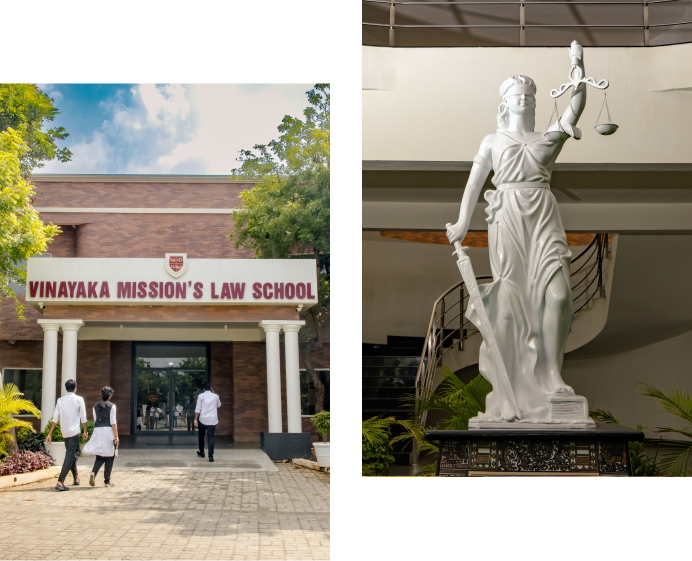Vinayaka Mission's Law School
Law School of the Future

Vinayaka Mission's Law School (VMLS) is being mentored by O.P. Jindal Global University (an Institution of Eminence) and Jindal Global Law School under an institutional mentorship agreement.

Law School of the Future


Vinayaka Mission's Law School (VMLS) is being mentored by O.P. Jindal Global University (an Institution of Eminence) and Jindal Global Law School under an institutional mentorship agreement.

Announcements

About Us
Vinayaka Mission’s Research Foundation (VMRF) is an innovative and pioneering University that offers a multi-disciplinary learning experience.
With the founding vision of creating the law school of the future, VMLS admitted its first cohort of students in 2021. Mentorship from India’s finest law school, Jindal Global Law School, and a committed team of full-time faculty members, many of whom are trained in globally renowned institutions, have resulted in pedagogic innovations at VMLS that make it a frontrunner in equipping learners with the skills, knowledge, exposure, and specializations required for professional success in the Artificial Intelligence age.
Mentoring Committee
Vinayaka Mission’s Law School is unique not only in its vision – excellence through inclusivity, and a steadfast emphasis on digital futures and climate transitions – but also its governance model. We are the first Indian legal education institution to be formally mentored by another private law school, arguably India’s finest at that – the Jindal Global Law School, and Jindal Global University, an institution of eminence. The active Mentoring Committee created under this one-of-its-kind mentorship agreement consists of eminent senior lawyers and distinguished academics, who steer VMLS towards its goals and vision.
Know More

From the Dean's Desk
Dr. Ananth Padmanabhan
Dean
A professional law degree has become increasingly appealing to students since India’s liberalization in the early 90s, driven by the opening of domestic markets, the rise in global trade, and the complexities of the new economic order. This spurred demand for smart, articulate, and competent professionals to lead in areas like mergers and acquisitions, private equity, venture capital investments, offshore tax structures, and complex commercial transactions. Consequently, national law schools and five-year programs gained prominence as law firms and companies sought to hire new graduates with attractive pay packages.
Academic Qualifications
- MSx Sloan Fellow, Business Administration, and Management, Stanford University Graduate School of Management, USA
- SJD and LL.M, University of Pennsylvania Carey Law School, USA
- B.A., LL.B (Hons.), National Law School of India University
Institutional Collaboration






















Faculty at VMLS
View All FacultyAt VMLS, our faculty is the embodiment of a ‘glocal’ perspective, combining global insights with local relevance to foster an educational environment of unparalleled quality. Our educators are not just teachers; they are world citizens with diverse experiences from across the globe. They bring this wealth of knowledge to the heart of Tamil Nadu, offering world-class education and opening doors of opportunity for the underprivileged. This unique blend of international expertise and local understanding ensures that our students are equipped to excel both in India and on the global stage.
News & Events
Infrastructure

Scholarships at VMLS
Over 140 scholarships worth ₹60 Lakhs available through VLAT, including merit-based, need-based, and female-focused awards—connect with our Program Advisor to learn more.
Know More




Constitution is not a mere lawyer’s document, it is a vehicle of life and its spirit is always the spirit of the age.
-B. R. AMBEDKAR









